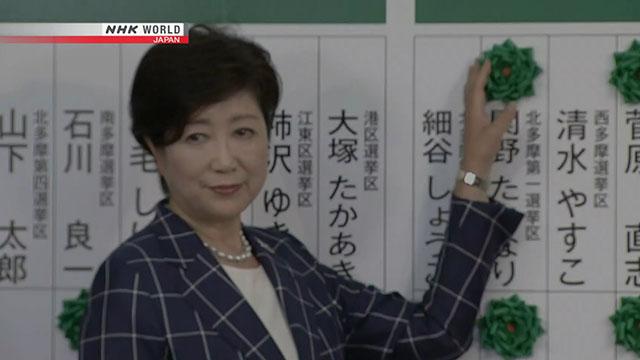"The voters wanted a change from the old politics and we were able to respond to that call by becoming the largest party in the assembly," said Tokyo Governor Yuriko Koike. "For the next 4 years, as a representative of Tokyo, I will strive to create a healthy government by working together with everyone."
Koike was also asked whether she will run nationally, but she says she has no such aspiration at the moment.
"To be honest, the voters' verdict was a harsh one," said Prime Minister Shinzo Abe. "We take it as anger towards our party. We do take this result seriously and will do a lot of soul-searching. We are determined to rebuild the party from scratch and bring about results to regain voters' trust."
Governor Yuriko Koike's new local party and candidates supporting her won 79 seats. Tomin First allowed 6 independents into the party, bringing it to a total of 55 seats. It is now the assembly's largest party. That's a blow to the Liberal Democratic Party which used to be the biggest force.
It suffered its worst ever showing in the assembly, winning only 23 seats.
One key LDP official says he will resign as chairman of the party's Tokyo chapter. Others in the LDP say the outcome reflects voter anger towards the Abe administration and are calling for a cabinet reshuffle.
Nationally, the party has been hurt by controversies over plans to open schools in western Japan. Opposition lawmakers allege that government officials gave favorable treatment to school operators who support the prime minister.
Also, there was more backlash after Defense Minister Tomomi Inada sought votes for the LDP on behalf of the Defense Ministry and SDF. This might have violated the law.
Asked what the biggest factor was the led to this defeat, Abe replied:
"It's been 5 years since the start of my administration. And now we've been getting criticism that we might be arrogant and complacent. I will take these opinions very seriously. But I want to be clear that we are determined to change that by remembering how we got here.
Koike used to be an LDP cabinet minister, but when she ran for governor last year, she did not receive the party's recommendation, sparking the formation of Tomin First.
She campaigned on assembly reform and heralded new members who she says lack political experience but can bring a fresh approach to the job with expertise in other areas.
Relocation of an iconic food market and preparations for the upcoming 2020 Tokyo Olympic and Paralympic Games were key issues during the campaign.
NHK World's senior commentator Hiroyuki Takahashi spoke with Miki Yamamoto about the outcome.
Yamamoto: So Hiroyuki, what's your take on the outcome?
Takahashi: I think this could be a sign of changes to come for the country's politics. Typically, the Tokyo election is seen as a bellwether for the national level.
The 2009 election is a great example of that, Back then, the LDP lost big to the Democratic Party of Japan at the Tokyo level. A month later, the LDP went on to a historic loss in the Lower House election, bringing the country a new ruling party and prime minister.
Let's bring things back to the present. There is one factor we should consider: that Governor Koike's Tomin First party is not registered as a national one. And it is unclear whether or not she wants to try her luck in the Diet.
Regardless of whether Koike's new party runs at the national level, I think this election shows there is major discontent with the LDP. And in Tokyo, voters spoke using the ballot box.
These results are surprising. Even though Abe and the party have been dogged with pressure from scandals over the past few months, I don't think people, including LDP insiders, really understood just how bad the results would be for the LDP.
And exit polls give a sense of the growing dissatisfaction. 57 percent of voters said they do not support Abe's Cabinet compared to 43 percent who do.
Yamamoto: How do you think the LDP will react to this loss?
Takahashi: In the short term, some party officials say they need a cabinet reshuffle to help rebrand how the party is viewed. That means some ministers with low popularity may be changed. I think Abe will try to highlight economic and diplomatic achievements that come his way in order to convince voters the LDP is still the party for the job.
But the thing is, no matter what he does, Abe and the LDP will have to face the voters again within the next year and a half in a nationwide Lower House election.
